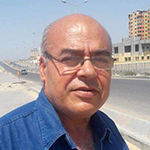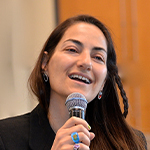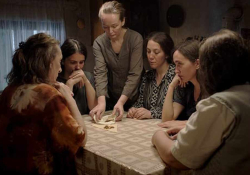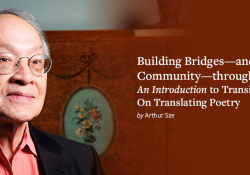Ringtones of My Mobile Phone
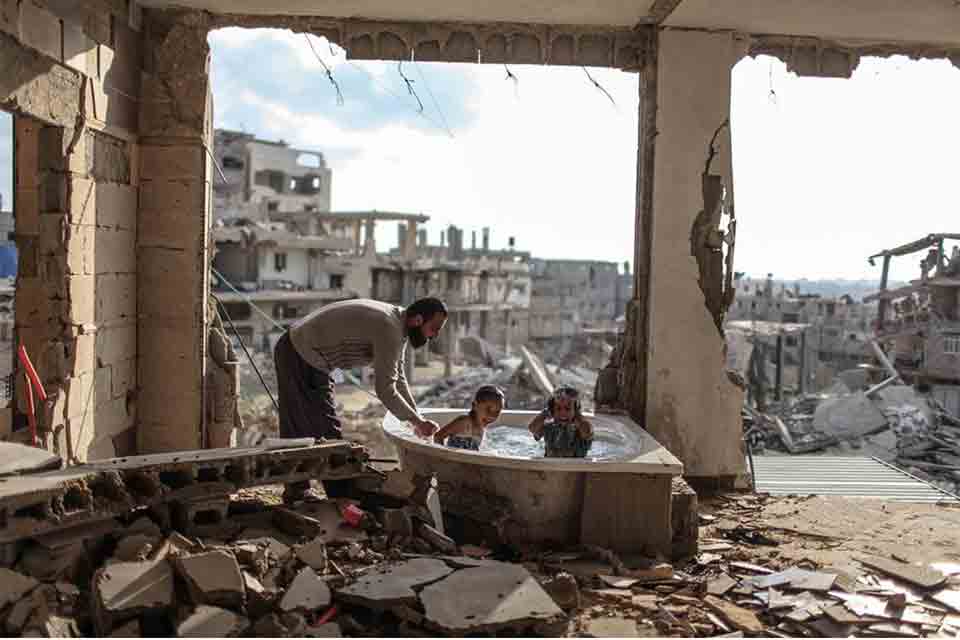
A writer living in Jabalia refugee camp in Gaza faces great loss with no way to say goodbye.
When writing about Gaza, one must purify the pen seven times, one time with fire, another with great humility, to make a pen fit for honoring tens of thousands of lost souls.
As for Gaza’s writers who survived, they will narrate with a trembling heartache death hovering over all that they loved, and death being the witness to their desperate screams.
Now, despite the ceasefire, war continues to rage in the mind. Screeching, whistling, roaring, falling, breaking, exploding, all do not cease. Buildings wail in anguish as multiple floors crash on the heads of people who inhabit them, scattering them like playing cards.
But this is not playing.
On the roads, there are human body parts. The bent electric poles hold severed human heads and shreds of human flesh.
Whoever writes about Gaza must write about warplanes as sky predators and about domesticated dogs becoming wild again as war turned cities into wilderness.
The Gazan writer must endure the memories of terror welling up from the eyes of children; the deep despair of mothers; and the nonstop destruction of all living beings, over 471 days of bombing.
Writing about Gaza, the pen passes through the rubble of homes and truckloads of corpses that include thousands of innocent children who came to life and lived only a short, harsh time and were left in shreds.
The Gazan writer will inform the world about the murder of hundreds of journalists, poets, teachers, physicians, firefighters, and civil servants.
After the demolition of four hundred thousand buildings, beautiful Gaza became the biggest wreckage in history. Factories disappeared. Farms became charcoal. All universities, schools, kindergartens, and hospitals were bombed.
Writers, such as myself, defy despair to set free the besieged truth before it, too, is killed. Gaza endured what equals a hundred earthquakes at once. It has become a wasteland surrounded by walls of death. Outside of death’s walls, I fling my story so that it may reach a reader far away from here.
Outside of death’s walls, I fling my story so that it may reach a reader far away from here.
In this story, the initial setting is the Jabalia refugee camp. It has the highest density of refugees in the world. Jabalia refugees are the descendants of Palestinians who were forced out of their home cities in 1948, the year Israel was established by forcing Palestinians into diaspora and taking their lands and homes.
Since then, the Jabalia refugees have been living in huts near the wall that separates them from the lands that were taken from them. From the roofs of their huts, across the wall, each time they gaze they see their confiscated homeland. This is the place, which is nearly forty-five kilometers in length and does not exceed fourteen kilometers wide.
On the afternoon of October 7, 2023, things appeared normal. The sunny street was almost empty. I was standing at the entrance of a shop when I heard the news: hundreds of militants had broken the siege and stormed the walls along the Gaza Strip . . .
The First Forced Displacement
Immediately afterward, the air bombardment began. Residential buildings collapsed with their residents inside them. Ambulances hurried to transport the dead.
In one hour, chaos ensued without warning. We had to leave our homes from the north of Gaza toward the south. My only choice was leaving. I had to care for my wheelchair-bound sick wife.
Four months into the war, she got a chance to leave for Egypt for medical help. But I was not allowed to accompany her. She died alone in Egypt.
I never thought that kidney failure would one day lead her to Egypt after warplanes destroyed all of Gaza’s hospitals. An ambulance took her. She left her last gaze in Gaza, and her sustenance was a last gaze from my heart to hers. We locked our gazes, not wanting to let go. My heart said: You will not see her again. Her eyes said: The end is nearing.
For a decade and a half, illness devastated her. I never let her down. But nearing the finish line, I failed her: she wanted to be buried near her mother in Jabalia’s camp cemetery.
At the beginning of the war, my wife and I escaped in a frenzy in compliance with orders of the invading Israeli soldiers. I hoped to reach Khan Younis and secure for her a chance for a kidney treatment somewhere the soldiers had not yet reached or destroyed. We escaped with other family members. Only my son, Samer, and his family remained in the house.
Samer insisted on staying with his wife and three children in Jabalia to care for his mother-in-law who was completely paralyzed and could not leave the house.
In Khan Younis, we became destitute for two months, always hungry amid excruciating pains. I helped my wife and followed the nonstop news of death arising from Jabalia camp.
The air raids reached us in the Khan Younis refugee camp as we were erecting a tent near the Red Crescent hospital. A nearby building was bombed, wounding one of my grandchildren, Mohammad, in his head. He was in a coma for days before he was transported to Egypt for medical help for a disability in his leg and hand.
The bombing continued, and so did our attempts to survive. To secure one kilogram of bread, I stood in line from early morning until sunset. Clean water became scarce, too. If available, one could have only small plastic containers to be carried long distances before reaching thirsting families.
After two months of air bombardment, the ground invasion of Khan Younis displaced us anew. We walked to the deep south until reaching Rafah, exactly near the border fence that separates Gaza from Egypt. We put our tent near the fence and greeted the Egyptian soldiers. They gazed at us in astonishment.
We worried about Samer and his family. Without electricity or an internet connection, knowing Jabalia’s news became impossible. Who died? Who was injured? Who survived? Questions bombarded us along with warplanes. People who escaped death from an explosion wondered if loved ones died in that same explosion.
When Israeli soldiers invaded Rafah, we were forced into the third displacement. Our only option was to return to Khan Younis and put up a tent by the sea. Quickly, a sea of refugee tents formed parallelling the water. I memorized the location of our tent each time I left it. Finding it amid tens of thousands of other tents was a challenge.
Mobile Phone Ringtone
Two months later, my mobile phone rang. Matter-of-factly, I was told that my wife died. A deadly sadness followed. I felt powerless. I had let her down. Not allowed to accompany her, she died alone. I could not attend her funeral or write her name on a tombstone.
For days, I honored her in my fantasies: I imagined a small funeral. Some imaginary people hurried behind her, and an imaginary grieving Egyptian woman wailed: a Palestinian martyr!
I knitted streets without names and painted a faraway grave in a village named Damas, in Al-Dakahlia province in Egypt.
The Dogs
News reached us from northern Gaza: ambulances on the war-torn roads had become slower than the war-crazed dogs that hurried to eat the flesh of the wounded people. To escape their fangs, the wounded had to die faster than the arrival of dogs.
Dogs multiplied into organized packs, each nearing fifty. They chased the smell of blood of the wounded and the scent of fear of those escaping for their lives.
Our dogs then became addicted to eating human flesh! As our homes and neighborhood turned into jungles of wreckage, the packs of hungry dogs rushed from the tops of the hills like waterfalls.
The Sea
In winter, strong sea waves rose and swept away our tents and what little we owned. So, the sea prompted our fourth displacement. We hurried to the middle of the Gaza Strip, landing in Al-Zawaydah, where crowds of refugees extended as far as the eye could see. There, wherever we looked, warplanes were bombing. Guessing where the next bomb would fall, ambulance sirens confirmed or refuted our guesses.
Phone Ringing Again
At night, the tents become pregnant. With time, secrets become known. Under the whistling of rockets and the thunder of explosions, in the dead of the night, I heard voices: a child screaming in hunger from one side. A man cursing the world from another. A woman begging the divine at the top of her lungs: O God, please help, as though God won’t hear a low voice.
News of death became ordinary. Seeing death became ordinary. Children jumped over corpses on the roads and, like everyone else, announced:
—So and so died.
—Ten people died.
—Fifty people are under the rubble of that building.
—The dogs ate so and so . . .
Strangely, despite everything, our hearts pounded, ablaze with the desire for life.
Strangely, despite everything, our hearts pounded, ablaze with the desire for life.
The expression Harb Al-Ibadah, war of ethnic cleansing, or genocide, was on every tongue because of the staggering number of people killed daily. The number grew rapidly until it became in the hundreds daily. Five hundred Gazans could die in one strike. The Baptist National Hospital, Al-Ahli Al-Maamadani, was an example. We began hearing that entire families spanning four generations, as they gathered during the war, were all killed and wiped from the public record—none of them survived.
One morning at daybreak, I stepped outside of my tent to listen to soothing music on my mobile phone. Soothing music? Under bombardment and the news of death arriving nonstop? Yes! I desperately needed music.
Minutes later, I heard the ringtone of a text message. I ignored it for seconds. I had not expected what that tiny message hid:
—Samer was martyred.
Three words were enough to leave me overwhelmed, helpless, lonely, orphaned. I sank into silence for what seemed like an eternity. But the harrowing thought of the dogs made me want to know what happened to Samer’s body. I begged the unknown to tell me.
Days passed before my eldest grandson managed to tell me by phone:
—The F-16 fighters bombed a house facing ours. We were terrified they might bomb ours next. We rushed outside and scattered in alleys so some of us would survive if attacked. A quadcopter drone fired a bomb at my father and killed him instantly. My mother was wounded too. Shrapnel severed my brother’s finger.
—Did you bury Samer? I demanded, screaming, because the dogs were barking madly in my mind’s eye as I waited for the boy to speak.
—We honored him, Grandpa! We smuggled his body to a hidden plot of land that has become an impromptu cemetery. We buried him near tens of other bodies.
In this war, we do not bury our dead or have a chance to say goodbye. My son, Samer, like his mother before him, left without a goodbye kiss from me. His body, running away from dogs, was carried by a few shoulders that were running away from warplanes.
In this war, we do not bury our dead or have a chance to say goodbye.
Before those who killed him arrived, his two young sons said goodbye to him. One of the boys had a severed finger as he buried his dad.
His son said: We were running, Grandpa! We dug the grave in a corner. We hid him in it and escaped.
Over there, in Jabalia camp, is the grave of my son.
Over there, beyond Jabalia, in Egypt, is the grave of my wife.
Within two months, both died far away from me. I did not see them. I am waiting until it is possible for me to see them. When will I be able to stand near their resting heads and to recite a prayer of peace for each of them, and to weep tears of eternal love?
Translation from the Arabic

